To enlarge photos, right-click and choose “Open image in New Tab.”
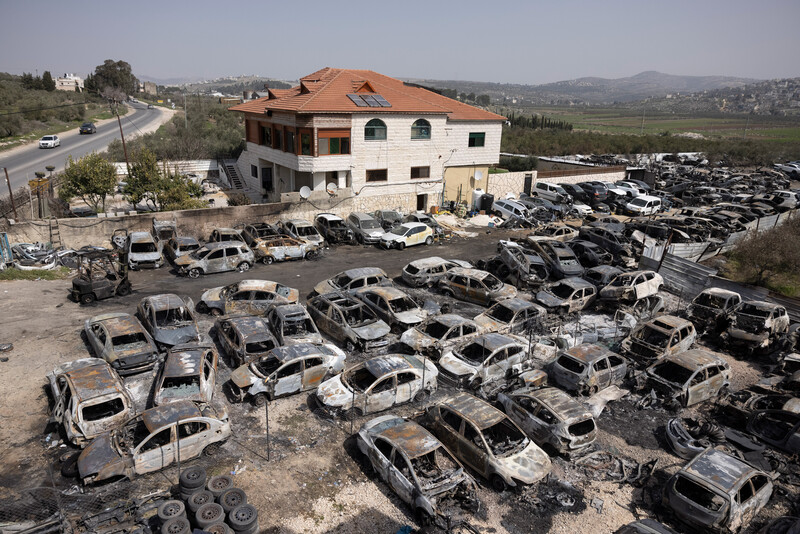
Burnt cars in the Palestinian town of Huwwara, near the West Bank city of Nablus, on 28 February after hundreds of settlers guarded by soldiers attacked homes, shops and vehicles two days earlier. (Oren Ziv, ActiveStills)
Israeli occupation forces and settlers killed 28 Palestinians in the West Bank during February – an average of one fatality per day – according to The Electronic Intifada’s tracking based on reports from media outlets and human rights groups.
Seven Israelis were killed during what occupation authorities said were attacks by Palestinians during the month. That figure includes a police officer who was shot by an Israeli civilian guard after he was allegedly stabbed by a 13-year-old Palestinian in the Shuafat neighborhood of East Jerusalem on 13 February.
Tor Wennesland, the UN secretary-general’s Middle East envoy, told the Security Council in late February that “we are witnessing a surge in violence, including some of the deadliest incidents in nearly 20 years.”
A coalition of Palestinian civil society groups meanwhile urged the International Criminal Court chief prosecutor to “urgently issue a preventive statement to deter the commission of more crimes by the Israeli authorities against Palestinians.”
More than half of all Palestinian fatalities in February occurred during two separate raids.
Five Palestinians were reportedly killed during a raid in Aqabat Jabr refugee camp near Jericho on 6 February. The deadly raid followed a 10-day siege after what Israel said was an attempted shooting attack during which a Palestinian allegedly fired one bullet at a road junction.
Israel announced that five were killed and three were arrested during the raid. But the Palestinian human rights group Al-Haq said that “the actual fate of those Palestinians remains unknown as Israel continues to withhold the bodies of those killed” and those arrested were “illegally transferred” into Israel.
Eleven people were killed during a daytime incursion into Nablus’ city center on 22 February – the single deadliest Israeli operation in the West Bank since the UN began tracking data in 2005.
The second most deadly Israeli operation during that period occurred in January, when occupation forces killed 9 Palestinians in Jenin refugee camp; a 10th person later died from his injuries.
Among those killed during the Nablus raid were a boy and at least two men over the age of 60 and three armed resistance activists who were apparently extrajudicially executed when Israel applied the pressure cooker procedure on a structure in which they were hiding.
Video documentation of the raid shows Israel using lethal force against Palestinians in an apparently wanton manner. Dozens of Palestinians were injured by live fire.
Sixty-seven Palestinians have been killed since the beginning of the year, or died from injuries sustained previously, according to The Electronic Intifada’s monitoring.
Fatalities
On 3 February, Abdullah Qalalweh, 25, was shot and killed by soldiers after he reportedly ran towards them at Huwwara checkpoint near the West Bank city of Nablus and didn’t heed their commands to stop.
On 7 February, Israeli soldiers shot and killed 16-year-old Hamza Amjad Yousif Ashqar as Palestinian youth confronted occupation forces during a raid in Nablus.
Two days later, Sharif Hasan Rabbaa, 22, was shot and killed after allegedly attempting to stab soldiers in Fawwar refugee camp near the West Bank city of Hebron.
On 10 February, Hussein Qaraqe was apparently extrajudicially executed by an off-duty police officer after he crashed his car into a group of people at a bus stop in Ramot, a settlement in the occupied West Bank north of Jerusalem.
Three Israelis, including two children, were killed in addition to Qaraqe. Israel alleges that the crash was a car ramming attack but the driver’s family said that Qaraqe lived with severe psychological difficulties resulting from a fall from a crane years earlier.
Qaraqe was released from a psychiatric ward after experiencing a psychotic episode in the days before the deadly crash. A relative told Israeli media that Qaraqe was heavily medicated and denied that it was a “terror attack,” as claimed by Israeli authorities.
On 11 February, 27-year-old Mithqal Suleiman Rayyan was shot in the head and killed by a settler in Qarawat Bani Hassan, a town near Salfit. The town’s mayor said that settlers, who frequently attack the community, had provoked residents, who attempted to defend themselves by throwing stones.
Palestinians in Qarawat Bani Hassan told Israeli media that witnesses who can identify the settlers who killed Rayyan were not interviewed by Israeli authorities.
The Israeli human rights group Yesh Din points to “a longstanding systemic failure” by Israeli authorities in response to settler violence against Palestinians.
The following day, an Israeli sniper shot and killed Qusai Radwan Yousif Waked, 14, during a daytime raid in Jenin refugee camp. The teen, who was unarmed, was standing some 100 feet between three armed men “when an Israeli sniper exchanged fire” with the latter, according to Defense for Children International-Palestine.
Another Palestinian, 21-year-old Amir Bustami, was shot and killed during a raid in Nablus on 13 February.
The following day, an Israeli sniper shot and killed 17-year-old Majid Muhammad Ayed while Palestinians confronted raiding occupation forces in al-Faraa refugee camp near Nablus.
Also on 14 February, Harun Abu Aram, 25, died from injuries sustained when he was shot by Israeli soldiers in the Masafer Yatta area south of Hebron in 2021. Abu Aram and others were trying to take back an electricity generator that soldiers had confiscated from a family when he was paralyzed by an Israeli bullet.
On 20 February, two days before Israel’s deadly raid in Nablus, 16-year-old Muntaser Muhammad Deeb Shawa died from wounds sustained while he was participating in confrontations against Israeli soldiers during an incursion in Balata refugee camp on 8 February. Soldiers had raided the Nablus area in order to escort Israeli settlers to Joseph’s Tomb, a flashpoint of deadly occupation violence.
Another Palestinian, 30-year-old Ahmad Nabil Sabah, died on 23 February after being shot in the stomach during a raid in Jenin on 12 February. Sabah was reportedly a fighter with the Jenin Brigade.
On 24 February, 22-year-old Ahmad Jawabreh died one day after being shot by Israeli forces during confrontations in Arroub refugee camp near Hebron.
Huwwara attack
Sameh Aqtash, 37, was killed in Huwwara, near Nablus, on 26 February as hundreds of settlers attacked the town, hours after two Israelis were shot dead by a Palestinian assailant who has evaded capture.
Aqtash’s family contends that he was killed by soldiers.
Days before he was killed, Aqtash had returned from Turkey, where he was volunteering to support earthquake victims.
Two other Palestinians were shot and wounded during the rampage, another was stabbed and another beaten with an iron bar. Nearly 100 Palestinians were injured as a result of inhaling tear gas fired by the military.
During their eight-hour siege on Huwwara, Israeli settlers set fire to Palestinian homes and businesses, as well as trees and vehicles. The Israeli military “facilitated” the attack, according to Al-Haq, “by closing off all the entrances to the town in advance” and by “permitting the entrance of hundreds of settlers by foot and preventing the entry of medics and journalists.”
Earlier in the day, a settler leader put out a call for Huwwara to be “wiped out.” The settler leader’s tweet – which was liked by Israeli finance minister Bezalel Smotrich, newly appointed to head the civil administration in the West Bank – stated that “the deterrence that was lost must return now, there’s no room for mercy.”
The call to “wipe out” Huwwara was repeated by Smotrich and Zvika Fogel, a lawmaker in the former’s Jewish Power party, in the following days.
One day after the attack in Huwwara, Elan Ganeles, a 27-year-old dual US-Israeli citizen and Israeli army veteran, was shot and killed while driving in the Jordan Valley of the West Bank.
On 1 March, 22-year-old Mahmoud Jamal Hasan Hamdan was shot and killed during a raid into Aqbat Jaber refugee camp, which had been under siege following the slaying of Ganeles.
Israeli authorities said that “two suspects” in the killing of Ganeles were captured during the raid.
And on 2 March, Israeli forces shot and killed 17-year-old Muhammad Nidal Ibrahim Salim in the town of Azzoun, near the West Bank city of Qalqilya. Defense for Children International-Palestine said that the teen was the 14th Palestinian child killed by Israeli forces since the beginning of the year.
Also during February, a 75-year-old Israeli man died eight months after he was injured by an ax blow to his head during an attack in Elad, a city in Israel. His death brings to four the number of people who were allegedly slain by two Palestinians who were arrested after a 60-hour manhunt.
Meanwhile, a Palestinian prisoner died in Israeli custody with less than two years remaining in his 12-year sentence. The Palestinian Prisoners Club accused Israeli prison authorities of “deliberate procrastination” in providing Ahmad Abu Ali, 47, with necessary medical treatment.
More than 100 Palestinians were reported among the more than 50,000 people killed in catastrophic earthquakes that struck Turkey and Syria on 6 February.
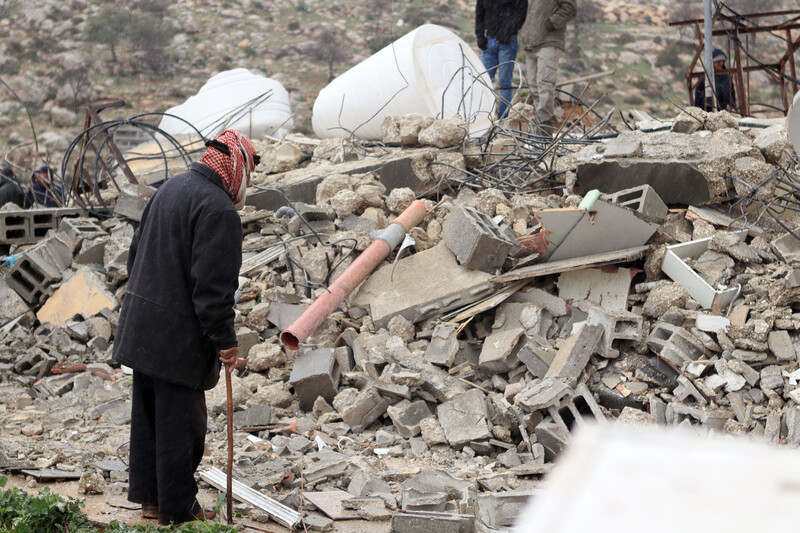
A Palestinian man observes the rubble after Israeli forces demolished two homes in Duma, a village near the West Bank city of Nablus, on 2 February. (Wahaj Bani Moufleh, ActiveStills)

Palestinian Authority leader Mahmoud Abbas attends the signing of a financial support package from the European Union in the West Bank city of Ramallah 2 February. (Thaer Ganaim, APA images)

Ahmed Abu Jazar is welcomed by friends and relatives in Rafah, in the southern Gaza Strip, following his release after 19 years in Israeli prison, 3 February. (Ashraf Amra, APA images)

A Palestinian woman cooks during a rainy day in Khan Younis, southern Gaza Strip, on 4 February. Ashraf Amra, APA images

A protester carries a sign reading “Palestinian lives matter” in Paris, France, soon after a state visit by Israeli Prime Minister Netanyahu, 4 February. The French president met with Netanyahu without publicly criticizing his new far-right government and the rise of violence, including extra-judicial killings, against Palestinians in the West Bank and elsewhere. Anne Paq, ActiveStills

Israeli protesters carry a banner with the names of Palestinians and Israelis killed in the context of the occupation in January during a mass protest against the far-right government in Tel Aviv, 4 February. Oren Ziv, ActiveStills

Barriers placed by the Israeli military block the road at Huwwara checkpoint near the West Bank city of Nablus after a Jewish settler’s car was hit by stones on 6 February. Mohammed Nasser, APA images

Palestinians protest in solidarity with political prisoners in Israeli jails and in protest of punitive measures against them in front of the Gaza City offices of the International Committee of the Red Cross, 6 February. Belal Salem, APA images
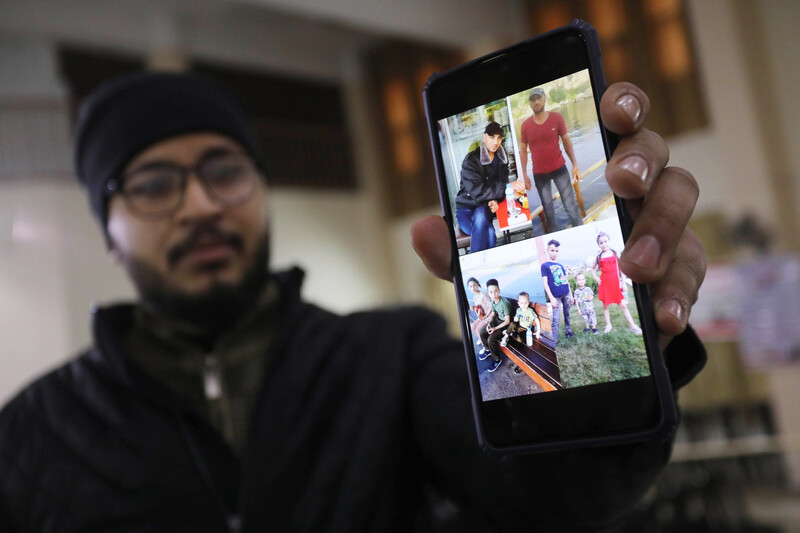
Relatives of Abdulkarim Abu Jalhoum, who died with his wife and their four children in the deadly earthquake in Turkey, mourn in their home in Beit Lahiya, northern Gaza Strip, 8 February. Ashraf Amra, APA images

Palestinians protest after the Israeli military closed Huwwara checkpoint, south of the West Bank city of Nablus, 10 February. Mohammed Nasser, APA images

Israeli emergency responders at the scene where a Palestinian driver struck several people at a bus stop near an Israeli settlement in East Jerusalem, killing three and seriously injuring several others, 10 February. Ilia Yefimovich, DPA

Palestinian artist Mohammed Totah with his sand sculpture expressing solidarity with Turkey and Syria following a devastating earthquake, Gaza City, 11 February. Ashraf Amra, APA images
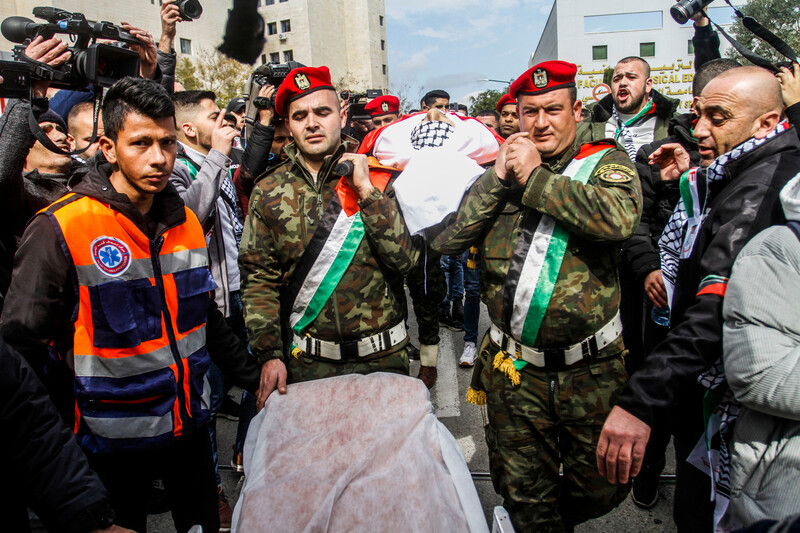
Mourners carry the body of Mithkal Suleiman Rayyan, 27, shot dead by Jewish settlers in the village of Qarawat Bani Hassan, during his funeral procession near the northern West Bank city of Nablus on 12 February. Mohammed Nasser, APA images

Palestinians inspect a site in Gaza City hit in an Israeli airstrike, 13 February. Ashraf Amra, APA images

Palestinians harvest flowers for Valentine’s Day in Khan Younis, southern Gaza Strip, on 14 February. Valentine’s Day is increasingly popular in the region as people have taken up the custom of giving flowers, cards, chocolates and gifts to sweethearts to celebrate the occasion. Ashraf Amra, APA images

Mourners attend the funeral of 17-year-old Mahmoud Ayed, shot and killed by Israeli forces during a raid, at al-Faraa refugee camp near the West Bank town of Tubas on 14 February. Stringer, APA images

Palestinians hold Friday prayers next to a building that houses 13 Palestinian families and is threatened with demolition by Israeli authorities in Silwan, East Jerusalem, 17 February. Oren Ziv, ActiveStills

Fatma Falah makes a basket with palm leaves using a traditional method at her family’s home in Deir al-Balah, central Gaza Strip, on 18 February. Ashraf Amra, APA images

Israeli soldiers attempt to violently remove activists from a checkpoint in the Masafer Yatta area of the West Bank on 18 February. Israeli and international activists blocked the military checkpoint in protest against restrictions on Palestinian residents’ movement and plans to expel them. Heather Sharona Weiss, ActiveStills

Palestinian Sufis celebrate the Islamic holiday of Isra Miraj in the old city of Nablus on 18 February. The holiday marks what Muslims believe is the Prophet Mohammad’s journey from Mecca to Jerusalem and it is believed to be followed by his ascension to heaven. Shadi Jarar’ah, APA images
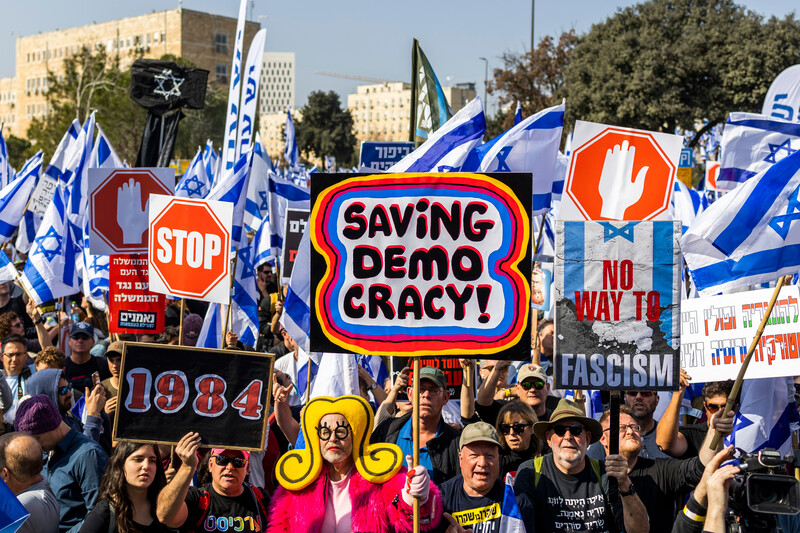
Israelis protest against the Netanyahu government’s judicial reforms outside Israel’s parliament in Jerusalem. Ilia Yefimovich, DPA
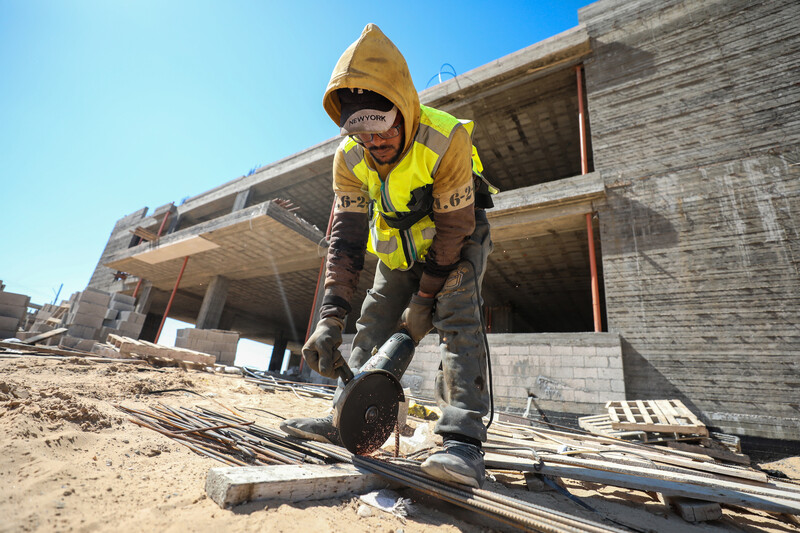
A Palestinian laborer works at the construction site of Rafah hospital in the southern Gaza Strip on 22 February. Atia Darwish, APA images

Palestinians confront occupation forces during an Israeli military raid in the West Bank city of Nablus on 22 February. Ten Palestinians were killed by live fire during the raid and one man over the age of 60 died from tear gas inhalation. Wajed Nobani, APA images

Damage at the site where Israeli forces killed Palestinians during a raid in the West Bank city of Nablus the previous day, 23 February. Mohammed Nasser, APA images

Palestinians protest in the West Bank city of Hebron on the 29th anniversary of the Ibrahimi mosque massacre, 24 February. On that day in 1994, an American-born settler opened fire inside the mosque during drawn prayers, killing 29 Palestinian men and boys and wounding more than 100 others. Mamoun Wazwaz, APA images

A Palestinian holds a tear gas canister fired by Israeli forces towards Palestinian protesters during a demonstration near the Israel-Gaza boundary in Khan Younis, southern Gaza Strip, 24 February. Ashraf Amra, APA images

A Palestinian man walks by a car set on fire by Jewish settlers in Burin village near the West Bank city of Nablus, 25 February. Ghassan Daghlas, a local Palestinian official, said that a group of settlers attacked homes on the outskirts of the village and hurled stones at them, terrorizing residents. Shadi Jarar’ah, APA images

Palestinians in Deir al-Balah, in the central Gaza Strip, protest against the deadly Israeli raid in Nablus on 26 February. Ashraf Amra, APA images

Palestinian students protest in support of armed resistance and against “security coordination” with Israel in Gaza City on 26 February. Ashraf Amra, APA images
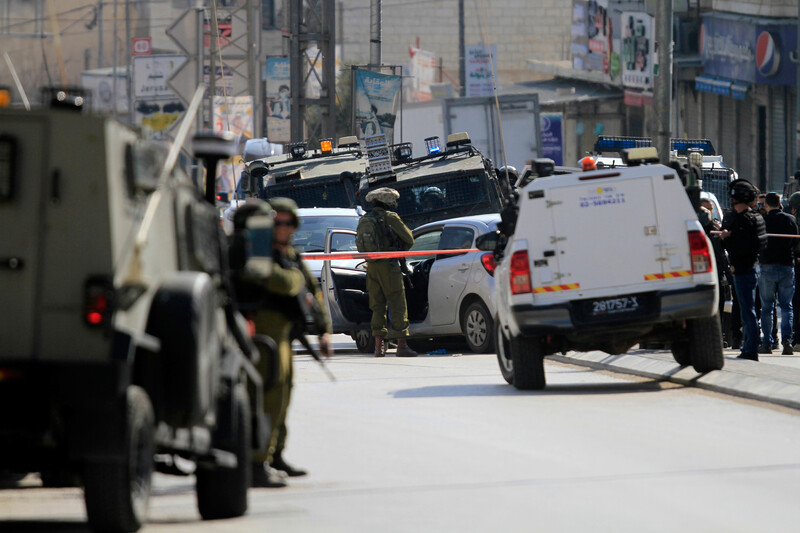
Israeli occupation forces gather at the scene of a shooting attack in Huwwara, near the West Bank city of Nablus, on 26 February. Two Israeli brothers who lived in a nearby settlement were killed in the attack by a gunman who evaded Israeli capture. Mohammed Nasser, APA images

Palestinians enjoy themselves during a traditional folk event near the boundary fence between Israel and Deir al-Balah, central Gaza Strip, on 27 February. Ashraf Amra, APA images

Israeli settlers gather in Huwwara near the West Bank city of Nablus on 27 February. The previous day, hundreds of settlers attacked the town following the shooting death of two Israelis who lived in a nearby settlement. Shadi Jarar’ah, APA images

Palestinians in Khan Younis, southern Gaza Strip, donate blood during a solidarity campaign with Turkey and Syria following a deadly earthquake, 8 February. Ashraf Amra, APA images

Nawal Dumeidi looks at the burned entryway to her home in Huwwara, near the West Bank city of Nablus, after the town was attacked by hundreds of settlers two days earlier, 28 February. Oren Ziv, ActiveStills
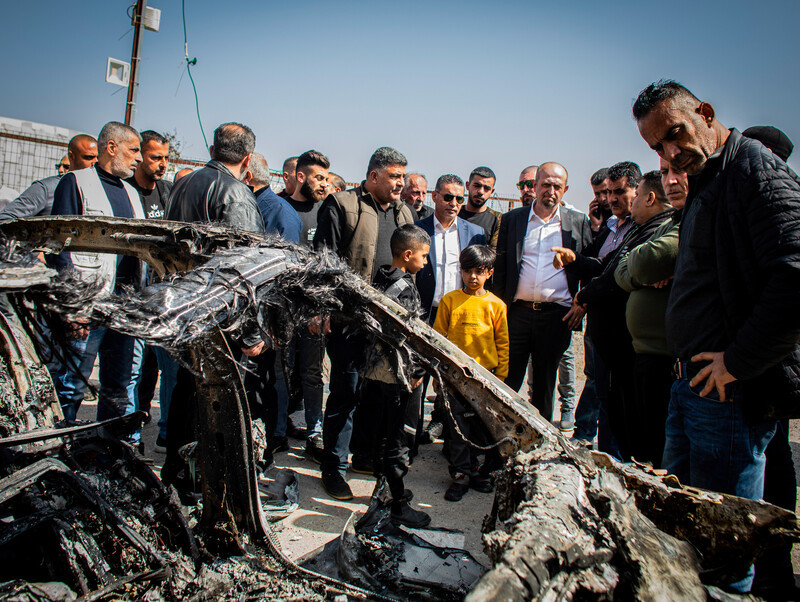
Hady Amr (sixth from the right), the US special representative for Palestinian affairs, stands among community leaders as they look at remains of a car torched by Jewish settlers in Huwwara on 28 February. US State Department spokesman Ned Price says the Biden administration expects Israel to prosecute those responsible for the deadly settler rampage of Huwwara and provide compensation for the Palestinians whose homes and property were destroyed or damaged. Eyal Warshavsky, SOPA Images
Leave a Reply